- Home
- J. D. Rhoades
Devils and Dust Page 3
Devils and Dust Read online
Page 3
“Thanks,” Angela replied.
“Long ride from the airport to here,” Lucas said. “Figured we might as well be comfortable.” He tossed Keller the keys.
Keller caught them in the air. He opened the back door and threw his duffel inside. “Let’s go.”
IN THE darkness, it was impossible to tell how long the truck had been on the road. Hours. Maybe days. Ruben fell into a kind of trance, fear and exhaustion turning his mind blank. Finally, the humming of the tires on pavement stopped and the truck was bouncing and jolting over another rough road. Eventually, it stopped. The people crammed inside murmured and stirred. The back door was yanked upward again, and bright light streamed in.
“Okay, muchachos,” a voice drawled, “ever’body out. Time to see the judge.”
Slowly, hesitantly, the people climbed out of the truck. Ruben and Edgar were the last ones out. Ruben looked around him, blinking in the bright sunlight.
They were on a flat space, pounded flat and worn down by multiple feet, in front of a row of long, low buildings that looked like barracks. Tall fences, topped with wicked-looking spirals of barbed wire, surrounded the area around the buildings. Beyond the wire, Ruben could see fields stretching out before the trees began again.
“Where is this place?” Edgar whispered. “Are we in prison?”
“No talking!” a voice barked. It was the blond man, still holding the shotgun trained on them. Other men with guns surrounded the group. “Form a line!” the blond man snapped. No one moved. The man raised the gun.
“Form a line!” Ruben shouted in Spanish. “Single file. Or he’ll shoot us.” They looked at him in surprise, but slowly shuffled into line.
The blond man was looking at Ruben appraisingly. “So,” he said, “You speaka de English.”
“A little,” Ruben said. “I learned in school.”
“Good. You’re the translator. Tell these assholes to march.” He gestured with his weapon toward a building down the row. The only tree inside the wire, a tall tree of a kind Ruben couldn’t identify, grew in front of it. “Building Three. That’s the Judicial Building.” The blond man grinned nastily. “Pray it’s the last time you have to see the inside of it.”
“That building.” Ruben pointed to the group. “Over there.”
Surprise was turning to resentment, but they complied.
When they got to the building with the large number 3 painted on the front, they were herded through the door into a large room, empty except for a table along the back wall. A pair of flags, one the familiar American flag, the other one a kind Ruben could not identify, flanked the table. The man who sat behind the table was the same bald man they had seen shoot the old man by the side of the road. This time, however, he was dressed in a black robe. As the group shuffled to a stop in front of him, he picked up a large wooden gavel lying on the table before him and banged it twice.
“All of you stand accused of attempting to violate the sovereign and sacred borders of the United States of America. The court has seen the evidence against you, to wit, that you all were apprehended, without passport or other legal authorization, in a truck just north of the Texas Border. Do any of you wish to offer any defense?”
They looked at each other in confusion. Ruben’s heart was in his mouth, but he had to speak.
“They don’t know what you’re saying,” he said. The blond man moved toward him, but the bald man motioned him away.
“If they don’t speak the language,” he said with a deadly mildness, “they shouldn’t be here.”
“What court is this?” Ruben said. “I thought in America, you could get a lawyer. And a chance to speak.”
“The courts,” the man said, “have become too weak and corrupt to deal with the threats we face. It’s up to the people to take justice back. To take their country back. And this…” he gestured with the gavel, “this is a court of the people, by the people, and for the people.”
Ruben opened his mouth to speak again, but not quick enough. The bald man smacked his gavel against the wood with a sound like a gunshot.
“Very well then. No valid defense is presented. The sentence is life at hard labor.”
“This is not right…” Ruben began. Pain exploded in the back of his head, driving him to his knees. He dimly heard someone screaming. A boot caught him in the stomach and doubled him over. Then another sudden shock of pain in his head, and everything went black.
“WHEN WAS the last time you saw him?” Keller said.
Angela sat up, startled. She had been dozing in the backseat. It was the first time Keller had spoken more than a couple of words since they had pulled out of the hotel parking lot. They had been driving for hours in near silence, Angela staring at the back of Keller’s head, wondering what to say, or when he would speak. Finally weariness had overcome her and she had closed her eyes.
“What?” she said, trying to collect her thoughts.
“Oscar,” Keller said. “When was the last time you saw him?”
“Jack,” Lucas said from the passenger seat. “Maybe we should talk about—”
“Later,” Keller cut him off. “Right now I need to know just how cold the trail is.”
Angela looked out the window. It was dark outside. All she could see was the shoulder of the road and the blacktop as far as the headlights reached. She had no idea where they were. This was a mistake. The thing that had made Keller such a successful hunter had always been his relentless focus. Once the hunt was on, there would be nothing else. It had been what defined him. It was also the thing that had nearly destroyed him.
Finally she spoke. “Three weeks ago.”
“Where?”
“He was at home. But he was going to see somebody. Somebody who he thought might be able to help get his sons into the country.”
“Did he give a name?”
She shook her head. “He said it was better that I didn’t know.” Keller didn’t speak. “I tried to get it out of him.”
Keller was drumming his fingers impatiently on the wheel. He took no apparent notice of her defensive tone. “How did he get the name?”
“We went and talked to an immigration lawyer,” she said. “Some guy in Charlotte.”
“The guy couldn’t help him?”
“No. He told us that since Oscar was in the country illegally, and he had no relatives in the U.S., there was no way he could apply for visas for the boys. At least nothing that wouldn’t take years. Then, as we were leaving, he called Oscar back in. Alone. When he came out, he was holding a piece of paper. It looked like there was a name and number on it. He wouldn’t show it to me.”
“How long was this before Oscar left?”
“A week. Maybe a week and a half.”
“He didn’t talk to anyone else?”
“Not that I know of.”
“Okay then. That’s where we start. The lawyer. You got a name?”
“Yeah. Delgado. Perry Delgado.”
“You got a phone?” Keller asked.
“Yeah,” Lucas said. He reached into the glove box. “I don’t think he’ll be in this late, though.”
“I know. See if you can get us tickets to Charlotte. Closest airport to here is Phoenix.”
“You don’t want to go home first?” Lucas asked.
Keller’s voice was tight with impatience. “The trail’s three weeks old. It gets colder every second.” He glanced in the rearview. “I’ll need to pick some things up in Charlotte. Probably a car, too. Not a rental. You got the budget for that?”
“Sure,” Angela said. “But why do you need another car?”
“If I get any good information from this Delgado character, Charlotte’s where we part ways,” Keller said. “You guys can go home while I follow—”
“No.” Angela said. “I’m going with you.”
“It doesn’t work that way, Angela,” Keller said. “I work alone.”
“He’s my husband. I go with you or the deal’s off.”
�
�Okay.” Keller slowed the car down and began pulling to the side of the road.
“What are you doing?” Lucas asked.
“The deal’s off. You go on home. I’ll get out here and hitch. Maybe Jules’ll give me my old job back.”
“Damn you, Keller—” Angela said.
“You knew the way I worked when you dug me up, Angela.” Keller’s voice was hard. “We do this my way, or not at all.” After he pulled the car to the shoulder, he threw it in park, and sat there with the engine running. He looked in the rearview again. “What’s it going to be?” She didn’t answer, just glared at him, her eyes locked on the reflection of his. “Fine,” Keller said. He opened the door and got out.
He was reaching for his duffel in the back when Angela said in a low, furious voice, “Get back in the car, Jack.” He didn’t answer. He yanked the duffel out and turned away. Angela turned to Lucas. “Would you talk to him?”
“I think this is one you two are going to have to settle yourselves,” Lucas said.
“He’s not seriously going to get out here? In the middle of nowhere?”
Lucas looked out the back window. “Looks like that’s exactly what he’s doing.”
“And you don’t intend to do anything about it?”
“Nope.”
“What the hell good are you, then?”
“Angela,” Lucas said. “Whatever relationship you two are going to have, you’re going to have to work it out if it’s going to work at all.”
“Damn it,” she said. She snatched up her cane and slid over to the driver’s side. With some difficulty, she got out the car door. They were on a four-lane highway, divided by a deep median. The empty land stretched out to the edge of sight, where it met the sky that arched overhead like an overturned bowl. The stars were hard, bright, and cold in the utter blackness of the desert night. Keller was walking toward the median, his duffel slung on his shoulder. She called after him.
“Can we at least talk about this after we talk to the lawyer? When we know if there’s even anywhere to go?”
He stopped, turned around. His face was unreadable. Finally, he nodded. He started walking back.
“Okay,” he said as he passed her. He tossed the duffel back in the backseat. He climbed into the back after it. “You drive for a while,” he said. “We need to go straight through.” She stared at him for a moment. He stretched out in the backseat and closed his eyes. She shook her head and got behind the wheel.
THE MATTRESS beneath Ruben’s back was soft, lumpy, and smelled of mildew. His head pulsed with pain as he opened his eyes. The bottom of another mattress, crisscrossed with rusted wire supports above him, was all he could see. He tried to sit up, thinking the pain couldn’t get worse. He was wrong. He lay back down.
“Easy, friend,” a voice said in Spanish. Ruben turned his head, slowly. A man was sitting on the lower bunk of the bed next to him. It was Diego. “You took a bad shot to the head. One of those assholes hit you with his gun. From behind.”
“My brother,” Ruben whispered. His voice felt rusty. “Where’s my brother?”
“He’s here,” Diego said. He raised his voice. “EDGAR!”
Ruben winced at the volume and looked around. He was in a long narrow room. There was a row of bunk beds against both walls. A long wooden bench ran down the center of the room, with posts rising to the ceiling every ten feet or so. The walls were wooden, rough, and unpainted. There were no windows, only slits high up in the walls, which let in a little light and less air. A few men lay on the bunks, with others gathered around one end of the bench, talking in low voices. Some were the men he’d been traveling with, but there were others he didn’t recognize. We aren’t the first ones to be brought to this place.
Edgar detached himself from the edge of the group and came over, worry etched on his face. He sat next to Diego. Ruben held out a hand. Edgar took it and squeezed. “I’m okay, little brother,” Ruben said.
“Don’t tell them he’s your brother,” Diego advised. “One of the guys who’s been here a while says they separate everyone who’s related. All the women and girls went one way. My sister was one of them. The men are here and in another house.”
“What is this place?” Edgar said. “Why are we here?”
Ruben tried again to sit up. The pain was only slightly less, but he felt he could bear it. “Those men. The ones who brought us here. They said we broke the law.”
Edgar looked frightened. “Are we in prison?”
Diego shook his head. “No. I was in jail in America before. The first time they threw me out. That was no real court. And they wouldn’t put a boy this young in prison with older men.”
“Then who are those guys?” Ruben asked.
“I don’t know,” Diego admitted. “But I think they’re crazy.”
“We have to get out of here,” Edgar said. He was beginning to look panicked.
“How?” Ruben said. “They have guns.”
“And the fence is electrified,” Diego said. “They told me a man killed himself a couple of weeks ago. Ran and threw himself on the fence. This may not be a real prison, but they’ve sure set it up like one.”
There was a commotion at the end of the room. Two men had come in, their machine guns held loosely at their sides. One of them was the blond man from the truck. The other was tall, skinny, and dark-complected, with what looked like a permanent five-o’clock shadow on his slack jaw and an unruly shock of dark hair shot through with streaks of gray that he didn’t look old enough to have. He dangled a toothpick loosely in one corner of his mouth.
“Okay, muchachos,” Blondie said. “Time to start earnin’ your keep. Line up.”
Slowly, the men and boys shuffled into line. Blondie noticed Ruben. “Can you work?” he demanded.
Standing up had made Ruben feel shaky and nauseated, but there was something in the question that told him what his answer needed to be. He nodded.
“Good,” Blondie said, “because we follow the Bible rule here. ‘If any would not work, neither should he eat.’ You may want to let the rest of your amigos know about that.”
Ruben thought of asking what Bible verse covered hitting people in the back of the head with gun butts, but he held his tongue.
They were marched out of the barracks, down the dirt path in front of the buildings, and through a wire gate. The land outside was dead flat, with lines of trees forming a wall all around, at least a mile away. Fields began a hundred feet or so from the wire—beans close in, corn and tobacco farther away. Prodded by the voices of the guards, they trudged down the dirt road between the fields until they were ordered to stop. A large farm truck rumbled up then pulled to a stop in a cloud of dust, which made the men cough and wave their hands in an effort to keep the choking stuff out of their eyes and noses. “Get the baskets out of the truck,” Blondie ordered. He gestured with his gun, and a couple of the men climbed up into the truck. The swarthy man with the toothpick still hadn’t spoken. The men started tossing large wicker baskets out. “Everybody get one,” Blondie ordered. The men on the ground looked at each other in confusion.
“Come on, damn it,” Blondie fumed. “You wetbacks came here to pick beans, didn’t you?” He bent down, picked up a basket, and thrust it at an older man in a flannel shirt. “Well, get your fucking basket and pick some fucking beans. It ain’t fucking siesta time.” The man took the basket, looking daggers at Blondie, who apparently didn’t like the look. He grabbed the old man by the shoulder and shoved him toward the field. The man stumbled, turned as if to protest, and found himself looking down the barrel of Blondie’s gun. “Go ahead,” Blondie said. “Somebody always gets made the first example of. Might as well be you, amigo.” The man turned back and walked into the field. Without looking at anyone, he bent down and began pulling the beans off the low stalks. Gradually, the others followed. Ruben and Edgar ended up side by side, next to the first man.
“I don’t know what I’m doing,” Edgar said. “I don’t know how—�
��
“Look for the ones that are this color,” the man said. He held up a fat seedpod, bright green. “Those are ripe. The others, leave for now.”
“I said, get to fucking WORK!” Blondie bellowed.
Ruben and Edgar stooped and began to pick.
THE LAWYER’S office was located on the fifteenth floor of a downtown office building. The paneling in the reception area was expensive, the lighting muted. Soft ambient music, which seemed to consist mostly of single notes gently struck and held for a long time, played in the background. The law firm’s name—Daniels, Gower and Delgado—was hanging on the wall in flowing silver and gold script behind the flawlessly beautiful Latina receptionist. The whole effect was one of calm, tranquility, and elegance.
Jack Keller was spoiling that effect. He stood before the chrome and wood receptionist’s desk, dressed in jeans and the same T-shirt he’d traveled in from Phoenix. It was late afternoon. Neither he nor Angela had slept, and they’d come straight from the airport. Keller had insisted. He’d felt the trail growing colder with each passing hour, and it was like an itch he couldn’t scratch. Fatigue etched deep lines in Angela’s face, but Keller felt as alert and energized as if he’d just come off eight hours’ sleep.
“I’m sorry, sir,” the receptionist said, “but if you don’t have an appointment—”
“Tell him it’s about Oscar Sanchez,” Keller said.
“We were here a few weeks ago,” Angela spoke up from behind him.
The receptionist gave her a professional smile. “Yes, Mrs. Sanchez, I do remember you.” She turned back to Keller, the smile tightening. “But Mr. Delgado is very busy—”
“Tell him Jack Keller is here.”
The smile vanished entirely. The receptionist looked at Angela, then at Keller, her face troubled. “Oh,” she said in a small voice. “He said you might come.” She stood up. “Please wait. Have…have a seat.” She exited through a door behind her.
Keller turned to Angela. “Did you two talk to this guy about me?”

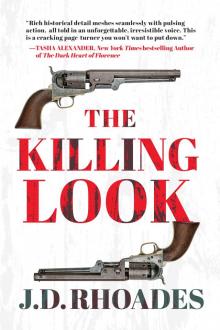 The Killing Look
The Killing Look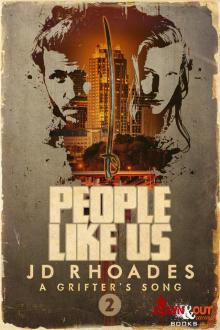 People Like Us
People Like Us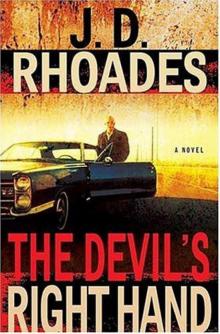 Jack Keller - 01 - The Devil's Right Hand
Jack Keller - 01 - The Devil's Right Hand Safe and Sound
Safe and Sound Ice Chest
Ice Chest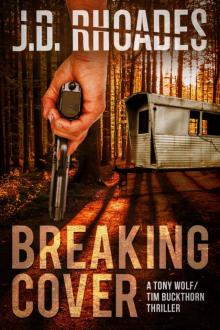 Breaking Cover
Breaking Cover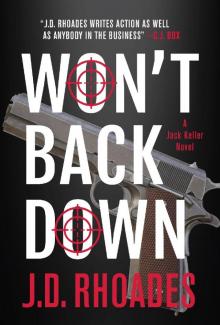 Won't Back Down
Won't Back Down Tony Wolf/Tim Buckthorn - 02 - Broken Shield
Tony Wolf/Tim Buckthorn - 02 - Broken Shield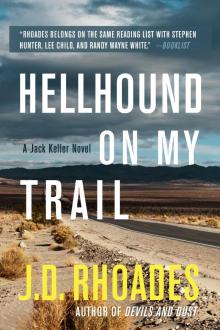 Hellhound On My Trail
Hellhound On My Trail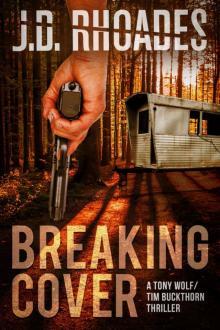 Breaking Cover (Tony Wolf/Tim Buckthorn)
Breaking Cover (Tony Wolf/Tim Buckthorn)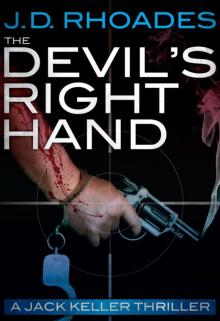 The Devil's Right Hand
The Devil's Right Hand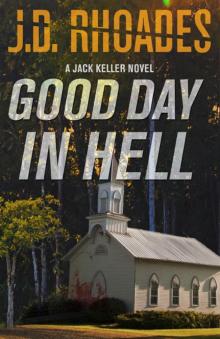 Good Day In Hell
Good Day In Hell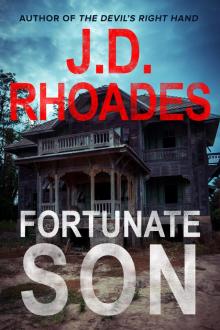 Fortunate Son
Fortunate Son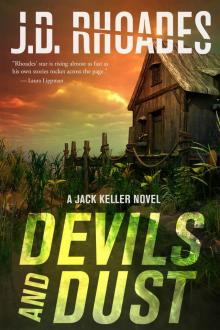 Devils and Dust
Devils and Dust